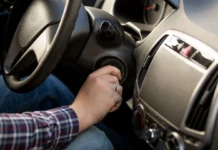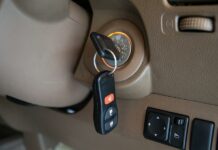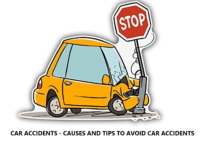Why won’t my car start? There can be a lot of different reasons for it. The weather outside is absolutely gorgeous, with the sun peeking out from behind the clouds and the temperature just perfect. You eagerly open your car door, ready for a productive day at work. Unfortunately, your excitement turns to frustration as you try to start the car, but the engine coughs and sputters, refusing to come to life.
There can be numerous reasons why a car won’t start, and while some cases may require professional help, there are several things you can try on your own before resorting to that. If you find yourself wondering why your car won’t start, there are a few important points to consider.
One common culprit is the car’s battery, which can get drained in cold weather conditions, especially in states like Michigan, Ohio, Wisconsin, Illinois, or any other areas with sub-zero temperatures.
It’s worth noting that repeatedly attempting to start the car can flood the engine and make the situation worse.
While there may be various potential causes behind your car’s failure to start, there are a few simple troubleshooting steps that you can take to get back on the road.
In this article, we will explore some of the common reasons why your car won’t start and provide you with practical tips to help you get your car up and running again.
Why Is Your Car Not Starting?
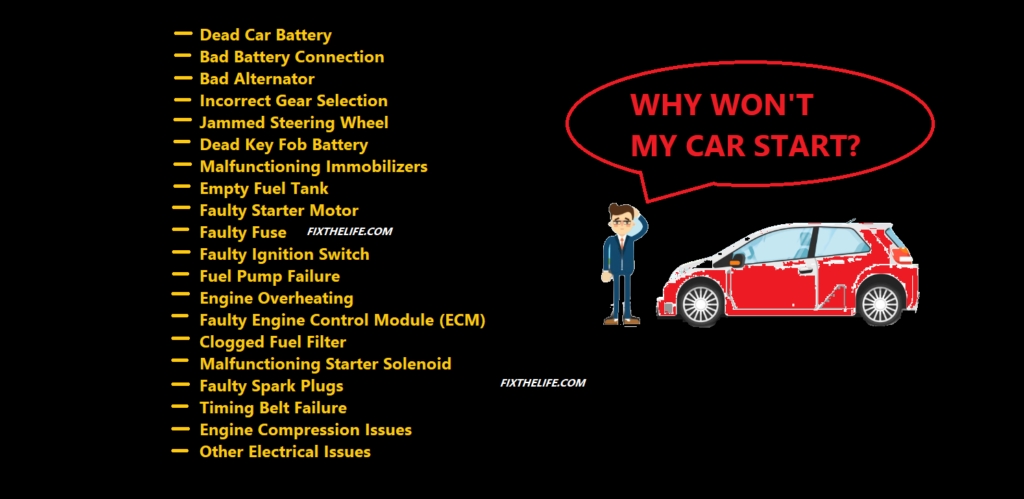
Dead Car Battery
- Batteries tend to die more frequently during winter, causing car starting issues.
- The car battery is a vital component of the vehicle’s electrical system, necessary for the functioning of the starter and engine ignition.
- Cold weather exacerbates battery problems, making winter fixes challenging without a garage.
What to do:
To revive a dead battery, jump-start it using jumper cables and another vehicle. Visit a quick fix auto shop for battery testing and recharge if it’s in good condition. Otherwise, replacement costs range from $50 to $200 depending on the vehicle’s make and model.
Bad Battery Connection
- Check battery connection cables for damage or looseness, as poor connections can prevent the flow of electrical power needed to start the car engine.
What to do:
Corroded battery terminals should be cleaned to ensure proper conductivity, preferably by a professional.
Bad Alternator
- The alternator works with the battery to power the vehicle, charging it while the car is running.
- A faulty alternator can cause the battery to die and fail to recharge properly.
What to do:
- To diagnose a bad alternator, let the car run after jump-starting it. If the car eventually dies, the alternator is likely the culprit.
- Replacing the alternator’s difficulty varies based on the vehicle’s make and model, but it is generally recommended to have it done at a mechanic shop.
Incorrect Gear Selection
- If the car won’t start, ensure it is in park or neutral, as being in gear can prevent the engine from starting.
What to do:
- Press the brake pedal and shift the car into park or neutral, then attempt to start the car again.
- If the car is already moving, shift it to neutral before trying to start it.
Jammed Steering Wheel
- If the key won’t turn, it might be due to a jammed steering wheel caused by the anti-theft steering lock feature.
What to do:
- Wiggle the steering wheel while gently turning the key to unlock the steering wheel.
- Once the car is turned on, the steering wheel will become unlocked.
Dead Key Fob Battery
- Some newer vehicles require a key fob to start the engine.
What to do:
- If the vehicle doesn’t recognize the dead key fob, replace its battery to enable starting the car.
Malfunctioning Immobilizers
- A low key fob battery or a malfunctioning immobilizer can prevent the vehicle from starting.
- Flashing lights may indicate a low battery or a missing key fob.
What to do:
- This is part of the anti-theft mechanism, and professional assistance may be required.
Empty Fuel Tank
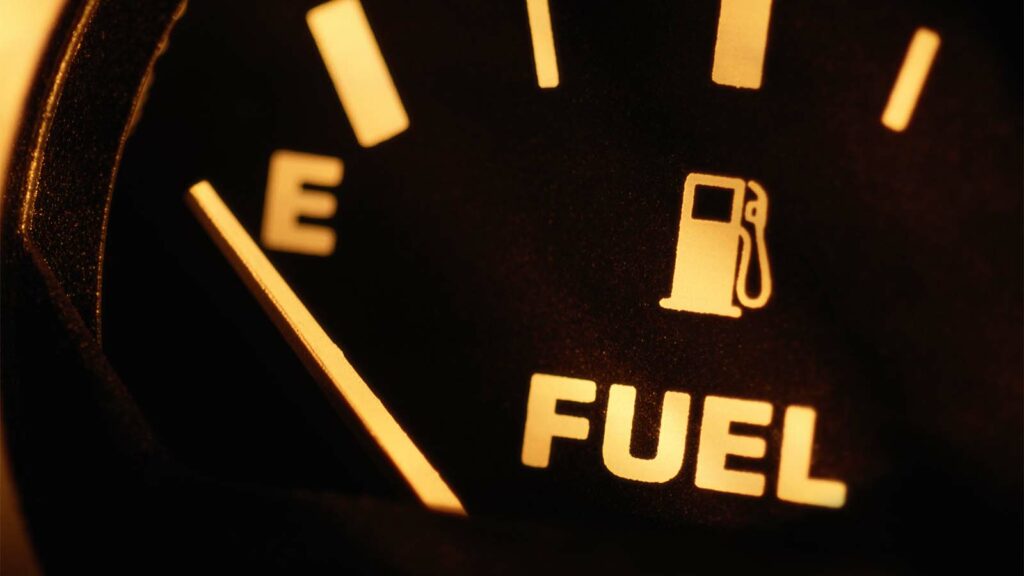
- If the gas tank is empty, the car won’t start.
- If the gas gauge is broken, monitor your fuel usage using the mile counter until you can get it fixed.
What to do:
- Walk to the nearest gas station with a gas can to get at least two gallons of gas. A jump-start may be necessary after refueling.
Faulty Starter Motor
- A bad starter motor is a common cause of a car not starting.
What to do:
- Turn the key, and if the lights come on but the car doesn’t start, it could indicate a faulty starter motor.
- Smoke from a blown fuse may be observed with continued attempts to start the car.
- If the starter is faulty, it’s best to call a tow truck and have it replaced by a professional.
Faulty Fuse
- A blown fuse can prevent the car from starting.
What to do:
- Check the fuse boxes under the hood and beneath the steering wheel to locate and replace any blown fuses.
- Severe fuse damage may require additional repairs to the wiring system.
Faulty Ignition Switch
- The ignition switch plays a crucial role in starting the vehicle.
What to do:
- Look for flickering dashboard lights or no response when turning the key, which may indicate a faulty ignition switch.
- In such cases, it’s recommended to have a professional inspect and replace the ignition switch if necessary.
Fuel Pump Failure
- A malfunctioning fuel pump can prevent the engine from receiving the necessary fuel to start.
- Signs of a faulty fuel pump include difficulty starting, engine sputtering, or a complete failure to start.
What to do:
- Professional diagnosis and replacement of the fuel pump may be required.
Engine Overheating
- An overheated engine can cause starting issues.
What to do:
- Check the temperature gauge on the dashboard to determine if the engine is overheating.
- If the engine is hot, allow it to cool down before attempting to start the car.
- Overheating may be caused by a variety of factors, such as a coolant leak, malfunctioning radiator, or a faulty thermostat. Seek professional assistance for diagnosis and repairs.
Faulty Engine Control Module (ECM)
- The ECM, also known as the engine control unit, manages various engine functions, including starting.
- If the ECM is faulty, it may prevent the car from starting.
What to do:
- Consult a professional mechanic to diagnose and repair any ECM-related issues.
Clogged Fuel Filter
- A clogged fuel filter can restrict the flow of fuel to the engine, resulting in starting problems.
- Regular maintenance and replacement of the fuel filter can help prevent this issue.
What to do:
- If a clogged fuel filter is suspected, have it inspected and replaced by a professional.
Malfunctioning Starter Solenoid
- The starter solenoid is responsible for engaging the starter motor when the key is turned.
- A malfunctioning solenoid can prevent the starter motor from functioning properly.
What to do:
- Professional diagnosis and replacement of the starter solenoid may be necessary.
Faulty Spark Plugs
- Worn-out or faulty spark plugs can lead to starting difficulties.
- Symptoms include engine misfires, rough idling, and difficulty starting the vehicle.
What to do:
- Inspect and replace spark plugs according to the manufacturer’s recommended maintenance schedule.
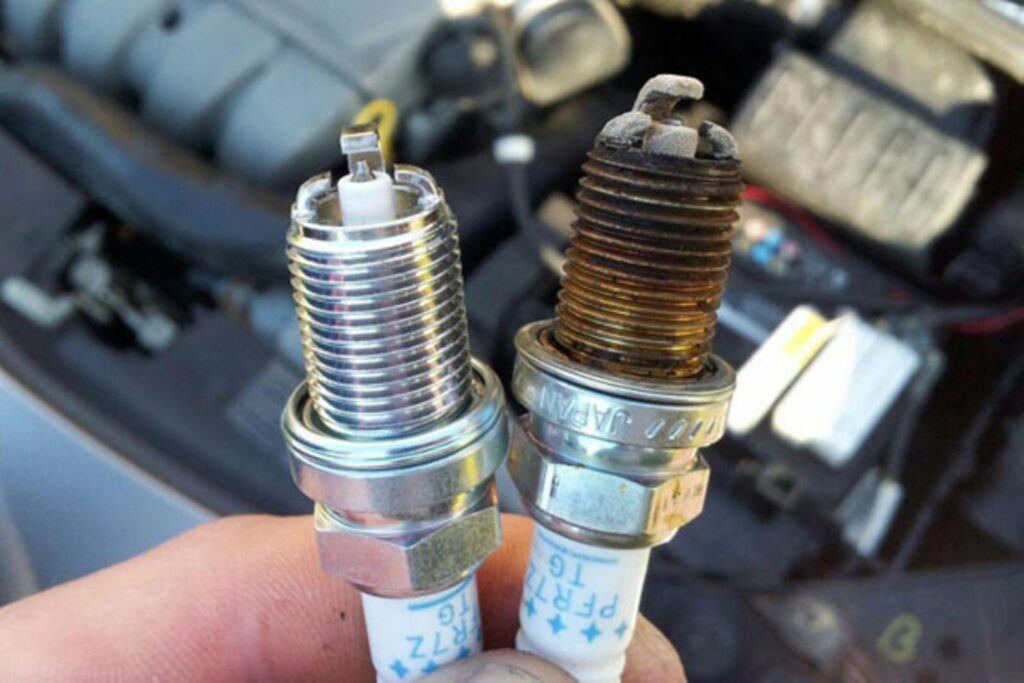
Timing Belt Failure
- If the timing belt breaks or slips, the engine’s timing will be affected, resulting in starting issues.
- Signs of a faulty timing belt include engine misfires, unusual noises, or a failure to start.
What to do:
- Timing belt replacement is a complex task best left to a professional mechanic.
Engine Compression Issues
- Low compression in the engine cylinders can prevent the car from starting.
What to do:
- This issue typically requires professional diagnosis and repair.
Other Electrical Issues
- Various other electrical problems, such as wiring issues, faulty sensors, or a malfunctioning ignition system, can cause starting difficulties.
What to do:
- A comprehensive diagnosis by a qualified mechanic is necessary to identify and resolve these types of issues.
Remember, if you’re experiencing persistent starting problems with your car, it’s best to consult a professional mechanic who can accurately diagnose and fix the underlying issue.
Reasons Why Car Won’t Start and Solutions
No Sound, No Lights
Issue: Battery Connection Problem
Solution: Check the cable connections at the battery. Even if they appear fine, try twisting and turning them by hand. If they can be moved easily, the connection is loose. Disconnect the cables, clean them with a cloth, and then reconnect them. Use a wrench to tighten the clamps properly. Afterward, attempt to start the car again.
Issue: Dead Battery
Solution: You can try jump-starting the car. Find someone with jumper cables and another vehicle. Follow the necessary steps for jump-starting your car.
No Sound But Dashboard Lights Go On
Issue: Car Not in Park or Neutral or Faulty Transmission Switch
Solution: Move the gear to either park or neutral and check if the car starts. Also, try pressing the brake pedal (or clutch for manual transmission cars) while attempting to start the car.
Issue: Faulty Starter Motor or Ignition Switch/Cables
Solution: Contact a towing service and have your car taken to a repair shop immediately.
Issue: Problem with the Key Fob
Solution: Even if the key fob’s battery is dead, there should be an alternative method to start the car. Consult your owner’s manual for instructions on how to start the car without relying on the key fob.
Engine Makes a Clicking Sound
Issue: Weak Battery
Solution: Turn on the headlights and check their brightness. If they come on strongly, it indicates a good battery, and the clicking sound suggests a bad connection or a faulty starter. If the lights are very dim, it points to a weak battery. In that case, you can try jump-starting the car.
Normal Cranking But Engine Won’t Fire
Issue: Running Out of or Very Low on Gas
Solution: Contact a service to bring you some fuel.
Issue: Flooded Engine (for older cars with carbureted engines)
Solution: Fully press the gas pedal and crank the engine. This action will help clear excess fuel from the combustion chamber.
Issue: Blown Fuse for Fuel Pump or Ignition Circuit
Solution: Locate the fuse box (refer to your owner’s manual for its location) and replace any blown fuses. Typically, spare fuses are provided in the fuse box by car manufacturers.
A Slow, Dying Crank
Issue: Weak Battery
Solution: Attempt a jump start and then promptly take your car to a mechanic as the problem is likely to occur again.
A Crank With a Grinding Noise
Issue: Starter Not Engaging the Flywheel
Solution: Turn the key on and off three or four times to try catching the flywheel and starting the engine. However, this indicates broken teeth on the flywheel, so it’s crucial to have your car inspected by a repair shop immediately.
Super-Fast Cranking With a Spinning Noise
Issue: Broken Timing Belt
Solution: Stop cranking the engine immediately and call for a tow truck as this is a serious problem. To prevent this issue, include timing belt replacement as part of your regular maintenance routine.
Recommendation
How to Test a Fuse With a Multimeter
How To Tell If A Fuse is Blown? Check and Replace Blown Car Fuse
What is A Starter in A Car? Purpose, Limitations, & Improvements of a Car Starter
Importance of Knowing How To Use a Jump Starter
Conclusion
There are various reasons why a car won’t start, such as battery issues, faulty components, or mechanical problems. It is important to consult a professional mechanic for accurate diagnosis and appropriate solutions.


